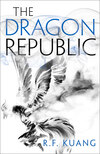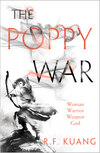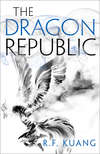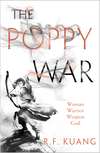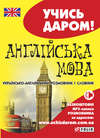Kitabı oku: «The Dragon Republic», sayfa 10
“We don’t know that.”
“So what, you’re going to go check?” Chaghan grabbed her shoulders and pinned her against the wall. “Listen to me. It’s over. Your coup is finished. Daji’s going to come for Dragon Province, and when she does, we’re going to lose. Vaisra can’t protect you. You need to run.”
“And go where?” she asked. “And do what?”
What did Vaisra promise you? You must know you’re being used.
Rin knew that. She’d always known that. But maybe she needed to be used. Maybe she needed someone to tell her when, and who, to fight. She needed someone to give her orders and a purpose.
Vaisra was the first person in a long, long time who had made her feel stable enough to see a point in staying alive. And if he died here, it was on her.
“Are you insane?” Chaghan shouted. “You want to live, you fucking hide.”
“Then you hide. I’m fighting.” Rin wrenched her wrists from his grasp and pushed him away. She used more force than she’d meant to; she’d forgotten he was so thin. He stumbled backward, tripped on a rock, and toppled to the ground.
“You’re crazy,” he said.
“We’re all crazy,” she muttered as she jumped over his sprawled form and set off at a run toward the council room.
Imperial guards had swarmed the council chamber, pressing steadily in against the two-man army that was Suni and Baji. The Warlords had scattered from their seats. The Hare Warlord huddled against the wall, the Rooster Warlord crouched quivering under the table, and the young Tiger Warlord was curled in a corner, head pressed between his knees as blades clashed inches from his head.
Rin faltered at the doors. She couldn’t call the fire now. She didn’t have enough control to target her flames. If she lit up the room, she’d kill everyone in it.
“Here!” Baji kicked a sword toward her. She scooped it up and jumped into the fray.
Vaisra wasn’t dead. He fought at the center of the room, battling both Jun and the Wolf Meat General. For a second it seemed like he might hold them off. He wielded his blade with a ferocious strength and precision that was stunning to watch.
But he was still only one man.
“Watch out!” Rin screamed.
The Wolf Meat General tried to catch Vaisra off guard. Vaisra spun about and disarmed him with a savage kick to the knee. Chang En dropped to the ground, howling. Vaisra reeled back from the kick, trying to regain his balance, and Jun took the opening to push his blade through Vaisra’s shoulder.
Baji barreled into Jun’s side and tackled him to the ground. Rin ran forward to catch Vaisra just as he crumpled to the floor; blood spilled over her arms, hot and wet and slippery, and she was astounded by how much of it there was.
“Are you—Please, are you—”
She prodded frantically around his chest, trying to stanch the blood with her palm. She could barely see the wound, his torso was so slick with blood, but finally her fingers pressed against the entry point in his right shoulder. Not a vital spot.
She dared to hope. If they acted quickly he might still live. But first they had to get out.
“Suni!” she shrieked.
He appeared instantly at her side. She pushed Vaisra into his arms. “Take him.”
Suni slung Vaisra over his shoulders the way one might carry a calf and elbowed his way toward the exit. Baji followed closely, guarding their rear.
Rin picked her way past Jun’s limp form. She didn’t know if he was dead or alive, but that didn’t matter now. She ducked under a guard’s arm and followed her men out, over the threshold and toward the closest well.
She leaned over the side and screamed Aratsha’s name into the dark surface.
Nothing. There was no time to wait for Aratsha’s response; he was there or he wasn’t, and Daji’s guards were feet away. All she could do was plunge into the water, hold her breath, and pray.
Aratsha answered.
Rin fought the urge to flail inside the pitch-black irrigation channels—that would only make it harder for Aratsha to propel her through the water—and instead focused on taking deep and measured breaths in the pocket of air that enveloped her head. Still, she couldn’t ward off the clenching fear that the air would run out. Already she could feel the warmth of her own stale breath.
She broke the surface. She clawed her way up the riverbank and collapsed, chest heaving as she sucked in fresh air. Seconds later Suni exploded out of the water, depositing Vaisra on the shore before climbing up himself.
“What happened?” Nezha came running up to them, followed closely by Eriden and his guard. His eyes landed on his father. “Is he—”
“Alive,” Rin said. “If we’re quick.”
Nezha turned to the two closest soldiers. “Get my father on the ship.”
They hoisted Vaisra up between them and set off at a dash toward the Seagrim. Nezha pulled Rin to her feet. “What just—”
“No time.” She spat out a mouthful of river water. “Have your crew weigh anchor. We’ve got to get out.”
Nezha slung her arm over his shoulder and helped her stagger toward the ship. “It failed?”
“It worked.” Rin stumbled into his side, trying to keep pace. “You wanted a war. We just started one.”
The Seagrim had already begun pushing away from its berth. Crewmen at both ends hacked the ropes keeping the ship tethered to the dock, setting it free to drift with the current. Nezha and Rin jumped into one of the rowboats dangling by the hull. Inch by inch the boat began to rise.
Above, deckhands lowered the Seagrim’s sails and turned them toward the wind. Below, a loud grinding noise sounded as the paddle wheel began to churn rhythmically against the water, carrying them swiftly away from the capital.
CHAPTER 10
The Seagrim’s crew operated under a somber silence. Word had spread that Vaisra was badly injured. But no news emerged from the physician’s office and no one dared intrude to ask.
Captain Eriden had issued only one order: to get the Seagrim far away from Lusan as quickly as possible. Any soldier not working a paddling shift was sent to the top deck to man the trebuchets and crossbows, ready to fire at first warning.
Rin paced back and forth by the stern. She didn’t have a crossbow or a spyglass, and in her state she was more of a hindrance than an asset to deck defense—she was too jumpy to hold a weapon steady, too anxious to comprehend rapid orders. But she refused to go wait belowdecks. She had to know what was happening.
She kept looking down at her body to check that it was still there, was still working. It seemed impossible to her that she had escaped an encounter with the Vipress unscathed. The ship’s physician had cursorily examined her for broken bones but found nothing. Aside from some bruising, she felt no serious pain. Yet she was convinced that something was deeply wrong with her; something deep, internal, a poison that had wrapped around her bones.
Chaghan, too, seemed badly shaken. He’d been silent, unresponsive until they pulled out of harbor, and then he had collapsed against Qara and sunk to the floor, knees drawn up against his chest in a miserable huddle while his sister bent over him, whispering words no one else could understand into his ear.
The crew, clearly unsettled, gave them a wide berth. Rin tried to ignore them until she heard gasping noises from the deck. At first she thought he was sobbing, but no—he was just trying to breathe, jagged gasps rocking his frail form.
She knelt down beside the twins. She wasn’t sure whether she ought to try to touch Chaghan. “Are you all right?”
“I’m fine.”
“Are you sure?”
Chaghan raised his head and took a deep, shuddering breath. His eyes were ringed with red. “She was—I’ve never … I never imagined anyone could be so …”
“What?”
He shook his head.
Qara answered for him. “Stable.” She whispered the word like it was a horrifying idea. “She shouldn’t be so stable.”
“What is she?” Rin asked. “What goddess is that?”
“She’s old power,” Chaghan said. “She’s something that’s been alive longer than the world itself. I thought she’d be weakened, now that the other two are gone, but she’s … if that’s the Vipress at her weakest …” He slammed a palm against the deck. “We were fools to try.”
“She’s not invincible,” Rin said. “You beat her.”
“No, I surprised her. And then for only an instant. I don’t think things like that can be beat. We got lucky.”
“Any longer and she would have had your minds,” Qara said. “You’d be trapped forever in those illusions.”
She’d turned just as pale as her brother. Rin wondered how much Qara had seen. Qara hadn’t even been there, but Rin knew the twins were bonded by some odd Hinterlander magic. When Chaghan bled, Qara hurt. If Chaghan was shaken by Daji, then Qara must have felt it back on the Seagrim, a psychic tremble that threatened to poison her soul.
“So we’ll find some other way,” Rin said. “She’s still a mortal body, she’s still—”
“She will squeeze your soul in her fist and turn you into a babbling idiot,” Chaghan said. “I’m not trying to dissuade you. I know you’ll fight her to the end. But I hope you realize you’re going to go mad trying.”
Then so be it. Rin wrapped her arms around her knees. “Did you see? In there, when she showed me?”
Chaghan gave her a pitying look. “I couldn’t help it.”
Qara looked away. She must have seen, too.
For some reason, in that moment Rin felt like it was the most important thing in the world for her to explain herself to the twins. She felt guilty, dirty, like she had been caught in a terrible lie. “It wasn’t like that. With him. With Altan, I mean—”
“I know,” Chaghan said.
She wiped at her eyes. “It was never like that. I mean—I think I wanted—but he never—”
“We know,” Qara said. “Trust us, we know.”
Rin was stunned when Chaghan reached out and put his arm around her shoulder. She would have cried, but she felt too raw inside, like she had been hollowed out with a carving knife.
Chaghan’s arm rested at an odd angle over her back; his bony elbow joint dug painfully into her bone. After a while she shifted her right shoulder, and he withdrew his arm.
Hours passed before Nezha reemerged onto the deck.
Rin searched his face for clues. He looked wan but not grief-stricken, exhausted but not panicked, which meant …
She hastened to her feet. “Your father?”
“I think he’ll pull through.” He rubbed at his temples. “Dr. Sien finally kicked me out. Said to give Father some space.”
“He’s awake?”
“Sleeping for now. He was delirious for a bit, but Dr. Sien said that was a good sign. Meant he was talking.”
She let loose a long breath. “I’m glad.”
He sat down and rubbed his hands down his legs with a small sigh of relief. He must have been standing beside his father’s bedside for hours.
“Watching something?” he asked her.
“I’m watching nothing.” She squinted at the receding outline of Lusan. Only the highest pagoda towers of the palace were still visible. “That’s what’s bothering me. No one’s coming after us.”
She couldn’t understand why the riverways were so calm, so silent. Why weren’t arrows flying through the air? Why weren’t they being pursued by Imperial vessels? Perhaps the Militia lay in wait at the gates at the province’s edge. Perhaps they were sailing straight toward a trap.
But the gates were open, and no ships came chasing after them in the darkness.
“Who would they send?” Nezha asked. “They don’t have a navy at the Autumn Palace.”
“And no one in any of the provinces has one?”
“Ah.” Nezha smiled. Why was he smiling? “You don’t understand. We’re not going back the same way. We’re headed out to sea this time. Tsolin’s ships patrol the Nariin coast.”
“And Tsolin won’t interfere?”
“No. Father’s made him choose. He’s not going to choose the Empire.”
She couldn’t understand his logic. “Because …?”
“Because now there’s going to be a war, whether Tsolin likes it or not. And he’s not putting his money against Vaisra. So he’ll let us through unharmed, and I’ll bet that he’ll be at our council table in under a month.”
Rin was frankly amazed by the confidence with which the House of Yin seemed to manipulate people. “That’s assuming he gets out of Lusan.”
“If he hasn’t made contingency plans for this I’ll be shocked.”
“Did you ask if he had?”
Nezha chuckled. “It’s Tsolin. Asking would be an insult.”
“Or, you know, a decent precaution.”
“Oh, we’re about to fight a civil war. You’ll have plenty of chances to take precautions.” His tone sounded ridiculously cavalier.
“You really think we can win this?” she asked.
“We’ll be all right.”
“How do you know?”
He grinned sideways at her. “Because we’ve got the best navy in the Empire. Because we have the most brilliant strategist Sinegard has ever seen. And because we’ve got you.”
“Fuck off.”
“I’m serious. You know you’re a military asset worth your weight in silver, and if Kitay’s on strategy, then that gives us excellent chances.”
“Is Kitay—”
“He’s fine. He’s belowdecks. He’s been chatting with the admirals; Father gave him full access to our intelligence files, and he’s getting caught up.”
“I guess he came around pretty quickly, then.”
“We thought he might.” Nezha’s tone confirmed what she already suspected.
“You knew his father was dead.”
He didn’t bother denying it. “Father told me weeks ago. He said not to tell Kitay. Not until we’d reached Lusan, anyway.”
“Why?”
“Because it would mean more if it didn’t come from us. Because it would feel less to him like manipulation.”
“So you let him think his father was alive for weeks?”
“We’re not the ones who killed him, were we?” Nezha didn’t look sorry in the slightest. “Look, Rin. My father is very good at cultivating talent. He knows people. He knows how to pull their strings. That doesn’t mean he doesn’t care about them.”
“But I don’t want to be lied to,” she said.
He squeezed her hand. “I would never lie to you.”
Rin wanted desperately to believe that.
“Excuse me,” said Captain Eriden.
They turned around.
For once, Eriden did not look immaculately groomed, was not standing at perfect attention. The captain was wan and diminished, shoulders slouching, lines of worry etched across his face. He dipped his head toward them. “The Dragon Warlord would like to see you.”
“I’ll go right now,” Nezha said.
“Not you,” said Eriden. He nodded to Rin. “Just her.”
Rin was surprised to find Vaisra sitting upright behind the table, wearing a fresh military uniform free of blood. When he breathed, he winced, but only slightly; otherwise he looked as if he had never been injured.
“They told me you dragged me out of the palace,” he said.
She sat down across from him. “My men helped.”
“And why would you do that?”
“I don’t know,” she said frankly. She was still trying to figure that out herself. She might have left him in the throne room. Alone, the Cike would have a better chance at survival—they didn’t need to ally themselves with a province that had declared open war on the Empire.
But then what? Where did they go from here?
“Why are you still with us?” Vaisra asked. “We failed. And I thought you weren’t interested in being a foot soldier.”
“Why does it matter? Do you want me to leave?”
“I would prefer to know why people serve in my army. Some do it for silver. Some do it for the sheer thrill of battle. I don’t think you are here for either.”
He was right. But she didn’t know how to answer. How could she explain to him why she’d stayed when she couldn’t articulate it to herself?
All she knew was that it felt good to be part of Vaisra’s army, to act on Vaisra’s orders, to be Vaisra’s weapon and tool.
If she wasn’t making the decisions, then nothing could be her fault.
She couldn’t put the Cike in danger if she didn’t tell them what to do. And she couldn’t be blamed for anyone she killed if she was acting on orders.
And she didn’t just crave the simple absolution of responsibility. She craved Vaisra. She wanted his approval. Needed it. He provided her with structure, control, and direction that she hadn’t had since Altan died, and it felt so terribly good.
Since she’d set the Phoenix on the longbow island she’d been lost, spinning in a void of guilt and anger, and for the first time in a long time, she didn’t feel like she was drifting anymore.
She had a reason to live past revenge.
“I don’t know what I’m supposed to do,” she said finally. “Or who I’m supposed to be. Or where I came from, or—or …” She broke off, trying to make sense of the feelings swirling through her mind. “All I know is that I’m alone, I’m the only one left, and it’s because of her.”
Vaisra leaned forward. “Do you want to fight this war?”
“No. I mean—I don’t—I hate war.” She took a deep breath. “At least I think I should. Everyone is supposed to hate war, or there’s something wrong with you. Right? But I’m a soldier. That’s all I know how to be. So isn’t that what I’m supposed to do? I mean, sometimes I think maybe I can stop, maybe I can just run away. But what I’ve seen—what I’ve done—I can’t come back from that.”
She looked at him beseechingly, desperate for him to disagree, but Vaisra only shook his head. “No. You can’t.”
“Is it true?” she asked in a small, scared voice. “What the Warlords said?”
“What did they say?” he asked gently.
“They said I’m like a dog. They said I’d be better off dead. Does everyone want me dead?”
Vaisra reached out and took her hands in his. His grip was soft. Tender, almost.
“No one else is going to say this to you. So listen closely, Runin. You have been blessed with immense power. Don’t guilt yourself for using it. I won’t permit it.”
She couldn’t hold the tears back anymore. Her voice broke. “I just wanted to—”
“Stop crying. You’re better than that.”
She choked back a sob.
His voice turned steely. “It doesn’t matter what you want. Don’t you understand that? You are the most powerful creature in this world right now. You have an ability that can begin or end wars. You could launch this Empire into a glorious new and united age, and you could also destroy us. What you don’t get to do is remain neutral. When you have the power that you do, your life is not your own.”
His fingers tightened around hers. “People will seek to use you or destroy you. If you want to live, you must pick a side. So do not shirk from war, child. Do not flinch from suffering. When you hear screaming, run toward it.”
PART II
CHAPTER 11
Nezha pushed her door open. “You awake?”
“What’s going on?” Rin yawned. It was still dark outside her porthole, but Nezha was dressed in full uniform. Behind him stood Kitay, looking half-asleep and very crabby.
“Come upstairs,” said Nezha.
“He wants to show us the view,” Kitay grumbled. “Get a move on so I can go back to sleep.”
Rin followed them down the hall, hopping on one foot as she pulled her shoes on.
The Seagrim was blanketed in such a dense blue mist that they might have been sailing through clouds. Rin could not see the landmarks surrounding them until they were close enough for shapes to emerge through the fog. On her left, great cliffs guarded the narrow entrance to Arlong: a dark sliver of space inside the yawning stone wall. Against the light of the rising sun, the rock face glimmered a bright crimson.
Those were the famous Red Cliffs of the Dragon Province. The cliff walls were said to shine a brighter red with every failed invasion against the stronghold, painted with the blood of sailors whose ships had been dashed against those stones.
Rin could just make out massive characters etched into the walls—words that she could see only if she tilted her head the right way and if the faint sunlight hit them just so. “What do those say?”
“Can’t you read it?” Kitay asked. “It’s just Old Nikara.”
She tried not to roll her eyes. “Translate for me, then.”
“You actually can’t,” Nezha said. “All of those characters have layers upon layers of meaning, and they don’t obey modern Nikara grammar rules, so any translation must be imperfect and unfaithful.”
Rin had to smile. Those were words recited straight from the Linguistics texts they’d both read at Sinegard, back when their biggest concern was the next week’s grammar quiz. “So which translation do you think is right?”
“‘Nothing lasts,’” said Nezha, at the same time that Kitay said, “‘The world doesn’t exist.’”
Kitay wrinkled his nose at Nezha. “‘Nothing lasts’? What kind of translation is that?”
“The historically accurate one,” Nezha said. “The last faithful minister of the Red Emperor carved those words into the cliffs. When the Red Emperor died, his empire fragmented into provinces. His sons and generals snapped up prize pieces of land like wolves. But the minister of the Dragon Province didn’t pledge allegiance to any of the newly formed states.”
“I assume that didn’t end well,” Rin said.
“It’s as Father says: there’s no such thing as neutrality in a civil war,” Nezha said. “The Eight Princes came for the Dragon Province and tore Arlong apart. Thus the minister’s epigram. Most think it’s a nihilistic cry, a warning that nothing lasts. Not friendships, not loyalties, and certainly not empire. Which makes it consistent with your translation, Kitay, if you think about it. This world is ephemeral. Permanence is an illusion.”
As they spoke, the Seagrim passed into a channel through the cliffs so narrow that Rin marveled that the warship did not breach its hull along the rocks. The ship must have been designed according to the exact specifications of the channel—and even then, it was a remarkable feat of navigation that they slipped through the walls without so much as scraping stone.
As they penetrated the passage, the cliffs themselves appeared to cleave open, revealing Arlong between them like a pearl hidden inside an oystershell. The city within was startlingly lush, all waterfalls and running streams and more green than Rin had ever seen in Tikany. On the other side of the channel, she could just trace the faint outlines of two mountain chains peeking over the mist: the Qinling Mountains to the east and the Daba range to the west.
“I used to climb up those cliffs all the time.” Nezha pointed toward a steep set of stairs carved into the red walls that made Rin dizzy just looking at them. “You can see everything from up there—the ocean, the mountains, the entire province.”
“So you could see attackers coming from every direction from miles off,” Kitay said. “That’s very useful.”
Now Rin understood. This explained why Vaisra was so confident in his military base. Arlong might be the most impenetrable city in the Empire. The only way to invade was by sailing through a narrow channel or scaling a massive mountain range. Arlong was easy to defend and tremendously difficult to attack—the ideal wartime capital.
“We used to spend days on the beaches, too,” said Nezha. “You can’t see them from here, but there are coves hidden under the cliff walls if you know where to find them. In Arlong the riverbanks are so large that if you didn’t know any better, you’d think you were on the ocean.”
Rin shuddered at the thought. Tikany had been landlocked, and she couldn’t imagine growing up this close to so much water. She would have felt so vulnerable. Anything could land on those shores. Pirates. Hesperians. The Federation.
Speer had been that vulnerable.
Nezha cast her a sideways look. “You don’t like the ocean?”
She thought of Altan pitching backward into black water. She thought of a long, desperate swim and of nearly losing her mind. “I don’t like the way it smells,” she said.
“But it just smells like salt,” he said.
“No. It smells like blood.”
The moment the Seagrim dropped anchor, a group of soldiers escorted Vaisra off the ship and ensconced him inside a curtained sedan chair to be carted off to the palace. Rin had not seen Vaisra in more than a week, but she’d heard rumors his condition had worsened. She supposed the last thing he wanted was for word to spread.
“Should we be concerned?” she asked, watching as the chair made its way down the pier.
“He just needs some shoreside rest.” Nezha’s words didn’t sound forced, which Rin took as a good sign. “He’ll recover.”
“In time to lead a campaign north, you think?” Kitay asked.
“Certainly. And if not Father, then my brother. Let’s get you to the barracks.” Nezha motioned toward the gangplank. “Come on. I’ll introduce you to the ranks.”
Arlong was an amphibious city composed of a series of interconnected islands scattered inside a wide swath of the Western Murui. Nezha led Rin, Kitay, and the Cike into one of the slim, ubiquitous sampans that navigated Arlong’s interior. As Nezha guided their boat into the inner city, Rin swallowed down a wave of nausea. The city reminded her of Ankhiluun; it was far less shabby but just as disorienting in its reliance on waterways. She hated it. What was so wrong with dry land?
“No bridges?” she asked. “No roads?”
“No need. Whole islands linked by canals.” Nezha stood at the stern, steering the sampan forward with gentle sweeps of the rudder. “It’s arranged in a circular grid, like a conch shell.”
“Your city looks like it’s halfway to sinking,” Rin said.
“That’s on purpose. It’s nearly impossible to launch a land invasion on Arlong.” He guided the sampan around a corner. “This was the first capital of the Red Emperor. Back during his wars with the Speerlies, he surrounded himself with water. He never felt safe without it—he chose to build a city at Arlong for precisely that reason. Or so the myth goes.”
“Why was he obsessed with water?”
“How else do you protect yourself from beings who control fire? He was terrified of Tearza and her army.”
“I thought he was in love with Tearza,” Rin said.
“He loved her and feared her,” Nezha said. “They’re not mutually exclusive.”
Rin was glad when they finally pulled up to a solid sidewalk. She felt far more comfortable on land, where the floorboards wouldn’t shift under her feet, where she was at no risk of tipping into the water.
But Nezha looked happier over water than she’d ever seen him. He controlled the rudder like it was a natural extension of his body, and he hopped lightly from the edge of the sampan to the walkway as if it were no more difficult than walking through a grassy field.
He led them into the heart of Arlong’s military district. As they walked, Rin saw a series of tower ships, vessels that could carry entire villages, mounted with massive catapults and studded with rows and rows of iron cannons shaped like dragons’ heads, mouths curled in vicious sneers, waiting to spit fire and iron.
“These ships are stupidly tall,” she said.
“That’s because they’re designed to capture walled cities,” Nezha said. “Naval warfare is a matter of collecting cities like gambling chips. Those structures are meant to overtop walls along major waterways. Strategically speaking, most provinces are just empty space. The major cities control economic and political levers, the transportation and communications routes. So control the city and you’ve controlled the province.”
“I know that,” she said, slightly irked that he thought she needed a primer on basic invasion strategy. “I’m just concerned about their maneuverability. How much agility do you get in shallow waters?”
“Not much, but that doesn’t matter. Most naval warfare is still decided by hand-to-hand combat,” Nezha explained. “The tower ships take down the walls. We go in and pick up the pieces.”
Ramsa piped up from behind them, “I don’t understand why we couldn’t have taken this beautiful, giant fleet and blasted the shit out of the Autumn Palace.”
“Because we were attempting a bloodless coup,” Nezha said. “Father wanted to avoid a war if he could. Sending a massive fleet up to Lusan might have given the wrong message.”
“So what I’m hearing is that it’s all Rin’s fault,” said Ramsa. “Classic.”
Nezha walked backward so that he could face them as he talked. He looked terribly smug as he gestured to the ships around them. “A few years ago we added crossbeams to increase structural integrity in the hulls. And we redesigned the rudders—they have more mobility now, so they can operate in a broader range of water depths …”
“And your rudder?” Kitay inquired. “Still plunging those depths?”
Nezha ignored him. “We’ve improved our anchors, too.”
“How so?” Rin asked, mostly because she could tell he wanted to brag.
“The teeth. They’re arranged circularly instead of in one direction. Means they hardly ever break.”
Rin found this very funny. “Does that happen often?”
“You’d be surprised,” Nezha said. “During the Second Poppy War we lost a crucial naval skirmish because the ship started drifting out to sea without its crew during a maelstrom. We’ve learned from that mistake.”
He continued to elucidate newer innovations as they walked, gesturing with the pride of a newborn parent. “We started building the hulls with the broadest beam aft—makes it easier to steer at slow speeds. The junks have sails divided into horizontal panels by bamboo slats that make them more aerodynamic.”
“You know a lot about ships,” Rin said.
“I spent my childhood next door to a shipyard. It’d be embarrassing if I didn’t.”
Rin stopped walking, letting the others pass her until she and Nezha stood alone. She lowered her voice. “Be honest with me. How long have you been preparing for this war?”
He didn’t miss a beat. Didn’t even blink. “As long as I’ve been alive.”
So Nezha had spent his entire childhood readying himself to betray the Empire. So he had known, when he came to Sinegard, that one day he would lead a fleet against his classmates.
Ücretsiz ön izlemeyi tamamladınız.
